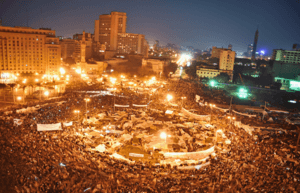Mahmoud Abu Zeid facts for kids
Quick facts for kids
Mahmoud Abou Zeid
|
|
|---|---|
| Mahmoud Abou Zeid | |
| Born | 1987 |
| Nationality | Egyptian |
| Other names | Shawkan |
| Occupation | Freelance photojournalist |
| Known for | Photos of protests in Cairo |
| Awards | John Aubuchon Press Freedom Award 2016. CPJ's 2016 International Press Freedom Awards. UNESCO/Guillermo Cano Press Freedom Prize 2018. |
Mahmoud Abou Zeid, also known as Shawkan, is an Egyptian photojournalist. He was born around 1987 in Kuwait. Shawkan became well-known for his photos of protests in Cairo.
In August 2013, he was arrested while taking pictures of a large protest gathering in Cairo, Egypt. He was held in prison by the Egyptian government for a long time. By September 2018, he was sentenced to a five-year prison term. He was finally released on March 4, 2019.
Contents
What is a Photojournalist?
A photojournalist is a special kind of journalist. They tell stories using pictures instead of just words. They go to important events and capture moments with their cameras. Their photos help people understand what is happening in the world.
Shawkan's Career and Work
Shawkan is a freelance photojournalist. This means he works for himself and sells his photos to different news organizations. He started working for Demotix in April 2010.
After a big change in the Egyptian government in 2013, Shawkan took many pictures of protests. His work was published in famous magazines and newspapers. These include Time, The Sun, and Die Zeit. His photos also appeared on the BBC website.
Many human rights groups have used his work. These groups include Amnesty International and Global Voices.
Why Shawkan Was Arrested
Shawkan was arrested on August 14, 2013. He was taking pictures of a large protest gathering in Cairo. Two other journalists were arrested with him. These two journalists were not Egyptian and were released later.
However, Shawkan remained in prison for more than two years without any formal charges. His case was part of a larger trial involving many other people. Even though he was a photojournalist, his camera was not used as proof of his job. This made his situation unclear.
By November 2015, he had been held without trial for over two years. On March 26, 2016, he was charged with several serious offenses. This meant he faced very serious consequences.
On September 8, 2018, an Egyptian court gave him a five-year jail sentence. His lawyer, Karim Abdelrady, said Shawkan should have been released soon after. The lawyer also said the sentence was unfair because Shawkan was just doing his job.
Shawkan was released early on March 4, 2019. This was six years after his arrest. As part of his release, he had to report to a police station every evening for five years. This probation period ended on August 14, 2023.
Journalists in Egypt
In 2015, Egypt was one of the top ten countries for jailing journalists. Shawkan was held in Egypt's Tora Prison. Many organizations believe journalists should not be arrested for doing their job.
Support and Recognition
Many people and groups around the world supported Shawkan. They used the hashtag #FreeShawkan on social media. Several organizations that protect press freedom called for his release. These include the Rory Peck Trust and the Committee to Protect Journalists (CPJ). Amnesty International started an online petition to help him.
In February 2015, the CPJ met with officials in Egypt. They asked for Shawkan's release. The "Press Uncuffed" campaign also featured Shawkan's case. This campaign helps free imprisoned journalists by raising awareness. In 2016, the CPJ even held an exhibit of Shawkan's photos.
In 2018, UNESCO gave Shawkan a special award. It was the UNESCO/Guillermo Cano Press Freedom Prize. This award honored his bravery and dedication to freedom of expression. The award jury president, Maria Ressa, praised his courage.
Shawkan's brother, Mohammed, spoke about his brother's imprisonment. He said Shawkan was just doing his job and never carried a weapon. He also mentioned that Shawkan was a freelancer, so he did not have a big company to support him.
The Free Shawkan Foundation was started by Shawkan’s friend, Ahmed Abu Seif. This foundation works to help Shawkan and other journalists who are in prison around the world.
Awards Received
- 2016, John Aubuchon Press Freedom Award: The National Press Club said this award showed how strict Egyptian authorities were with the press.
- 2016, International Press Freedom Award: This award came from the Committee to Protect Journalists.
- 2018, UNESCO/Guillermo Cano Press Freedom Prize: This prestigious award from the United Nations recognized his important contributions.
Images for kids
See also
 In Spanish: Mahmoud Abu Zeid para niños
In Spanish: Mahmoud Abu Zeid para niños
- Human rights in Egypt
 | Jessica Watkins |
 | Robert Henry Lawrence Jr. |
 | Mae Jemison |
 | Sian Proctor |
 | Guion Bluford |



